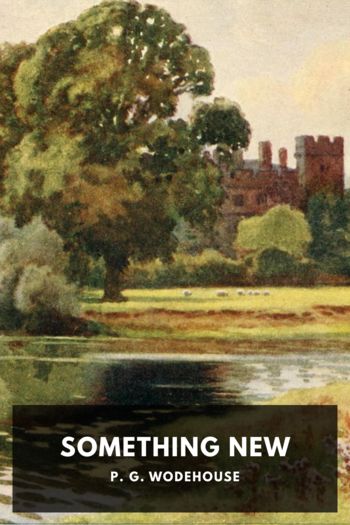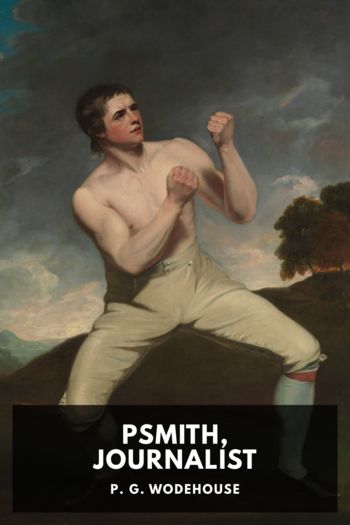Leave It to Psmith - P. G. Wodehouse (i wanna iguana read aloud .TXT) 📗

- Author: P. G. Wodehouse
Book online «Leave It to Psmith - P. G. Wodehouse (i wanna iguana read aloud .TXT) 📗». Author P. G. Wodehouse
“Sheltering a criminal?”
“Yes.” Baxter glanced at his watch. “I must go now or I shall miss my train,” he said curtly. “I was merely going to tell you that this fellow who calls himself Ralston McTodd is not Ralston McTodd at all.”
“Not Ralston McTodd?” repeated his lordship blankly. “But—” He suddenly perceived a flaw in the argument. “But he said he was,” he pointed out cleverly. “Yes, I remember distinctly. He said he was McTodd.”
“He is an impostor. And I imagine that if you investigate you will find that it is he and his accomplices who stole Lady Constance’s necklace.”
“But, my dear fellow …”
Baxter walked briskly to the door.
“You need not take my word for it,” he said. “What I say can easily be proved. Get this so-called McTodd to write his name on a piece of paper and then compare it with the signature to the letter which the real McTodd wrote when accepting Lady Constance’s invitation to the castle. You will find it filed away in the drawer of that desk there.”
Lord Emsworth adjusted his glasses and stared at the desk as if he expected it to do a conjuring-trick.
“I will leave you to take what steps you please,” said Baxter. “Now that I am no longer in your employment, the thing does not concern me one way or another. But I thought you might be glad to hear the facts.”
“Oh, I am!” responded his lordship, still peering vaguely. “Oh, I am! Oh, yes, yes, yes. Oh, yes, yes …”
“Goodbye.”
“But, Baxter …”
Lord Emsworth trotted out on to the landing, but Baxter had got off to a good start and was almost out of sight round the bend of the stairs.
“But, my dear fellow …” bleated his lordship plaintively over the banisters.
From below, out on the drive, came the sound of an automobile getting into gear and moving off, than which no sound is more final. The great door of the castle closed with a soft but significant bang—as doors close when handled by an untipped butler. Lord Emsworth returned to the library to wrestle with his problem unaided.
He was greatly disturbed. Apart from the fact that he disliked criminals and impostors as a class, it was a shock to him to learn that the particular criminal and impostor then in residence at Blandings was the man for whom, brief as had been the duration of their acquaintance, he had conceived a warm affection. He was fond of Psmith. Psmith soothed him. If he had had to choose any member of his immediate circle for the role of criminal and impostor, he would have chosen Psmith last.
He went to the window again and looked out. There was the sunshine, there were the birds, there were the hollyhocks, carnations, and Canterbury bells, all present and correct; but now they failed to cheer him. He was wondering dismally what on earth he was going to do. What did one do with criminals and impostors? Had ’em arrested, he supposed. But he shrank from the thought of arresting Psmith. It seemed so deuced unfriendly.
He was still meditating gloomily when a voice spoke behind him.
“Good morning. I am looking for Miss Halliday. You have not seen her by any chance? Ah, there she is down there on the terrace.”
Lord Emsworth was aware of Psmith beside him at the window, waving cordially to Eve, who waved back.
“I thought possibly,” continued Psmith, “that Miss Halliday would be in her little room yonder”—he indicated the dummy bookshelves through which he had entered. “But I am glad to see that the morning is so fine that she has given toil the miss-in-baulk. It is the right spirit,” said Psmith. “I like to see it.”
Lord Emsworth peered at him nervously through his glasses. His embarrassment and his distaste for the task that lay before him increased as he scanned his companion in vain for those signs of villainy which all well-regulated criminals and impostors ought to exhibit to the eye of discernment.
“I am surprised to find you indoors,” said Psmith, “on so glorious a morning. I should have supposed that you would have been down there among the shrubs, taking a good sniff at a hollyhock or something.”
Lord Emsworth braced himself for the ordeal.
“Er, my dear fellow … that is to say …” He paused. Psmith was regarding him almost lovingly through his monocle, and it was becoming increasingly difficult to warm up to the work of denouncing him.
“You were observing … ?” said Psmith.
Lord Emsworth uttered curious buzzing noises.
“I have just parted from Baxter,” he said at length, deciding to approach the subject in more roundabout fashion.
“Indeed?” said Psmith courteously.
“Yes. Baxter has gone.”
“For ever?”
“Er—yes.”
“Splendid!” said Psmith. “Splendid, splendid.”
Lord Emsworth removed his glasses, twiddled them on their cord, and replaced them on his nose.
“He made … He—er—the fact is, he made … Before he went Baxter made a most remarkable statement … a charge … Well, in short, he made a very strange statement about you.”
Psmith nodded gravely.
“I had been expecting something of the kind,” he said. “He said, no doubt, that I was not really Ralston McTodd?”
His lordship’s mouth opened feebly.
“Er—yes,” he said.
“I’ve been meaning to tell you about that,” said Psmith amiably. “It is quite true. I am not Ralston McTodd.”
“You—you admit it!”
“I am proud of it.”
Lord Emsworth drew himself up. He endeavoured to assume the attitude of stern censure which came so naturally to him in interviews with his son Frederick. But he met Psmith’s eye and sagged again. Beneath the solemn friendliness of Psmith’s gaze hauteur was impossible.
“Then what the deuce are you doing here under his name?” he asked, placing his finger in statesmanlike fashion on the very nub of the problem. “I mean to say,” he went on, making his meaning clearer, “if you aren’t McTodd, why did you come here saying you were McTodd?”
Psmith nodded slowly.
“The point is well taken,” he said. “I was expecting you to ask that question. Primarily—I want





Comments (0)